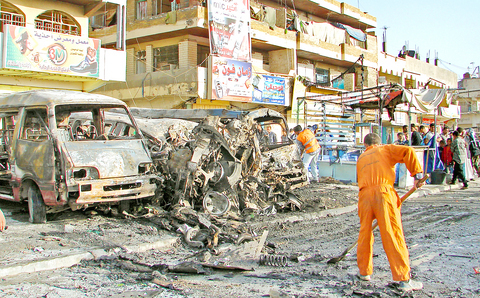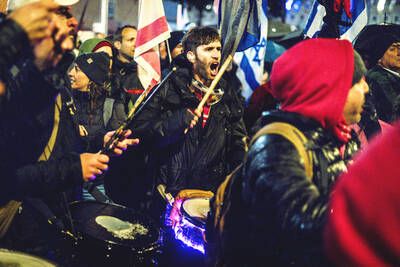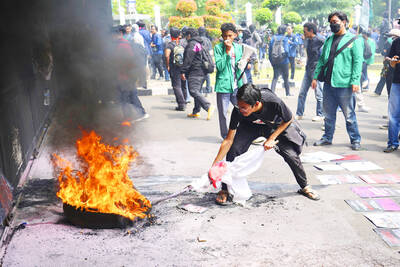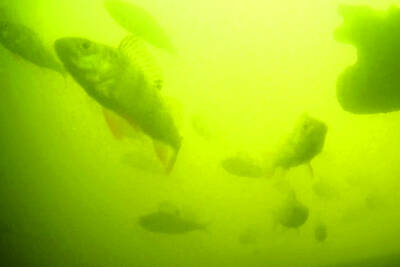Radical Shiite cleric Moqtada al-Sadr, whose directives can send thousands of heavily armed militiamen spilling into the streets, called for calm yesterday and blamed al-Qaeda in Iraq for the carnage in Baghdad's Sadr City slum that killed at least 48 people on Sunday and wounded more than 200.
Speaking at a news conference in the Shiite holy city of Najaf, south of Baghdad, al-Sadr also sought to blunt rage against Iraq's minority Sunni Muslim community in a bid to prevent the country from slipping into full-blown civil war.
"We are not weak, but we don't want to be dragged to a civil war. So, I will keep calling for calm," he said.

PHOTO: AFP
Al-Sadr is one of the country's most influential Shiite figures. Millions of Shiite faithful hang on his words and yesterday he used them for a bitter attack on Iraqi leaders.
"The politicians are busy, with one saying I want to be the prime minister and the other saying I want to be the president. They have forgotten the people and are looking out only for their narrow interests," he said.
By blaming Jordanian-born Abu Musab al-Zarqawi's al-Qaeda fighters for the attack, al-Sadr lifted the onus of blame from the mainstream Sunni community.
While Sunnis have been deeply involved the insurgency that has raged in Iraq since shortly after the US-led invasion toppled former Iraqi president Saddam Hussein, their fighters have mainly fought separately from al-Qaeda forces which are mainly from outside Iraq.
Al-Sadr's reaction to the deadly bombings in Sadr City about nightfall on Sunday was viewed as critical to how the country's majority Shiites would respond the attack. His declaration yesterday had the potential to inspire all-out civil strife.
Sectarian feelings were inflamed to the brink of civil war by bombing of a Shiite shrine on Feb. 22 and the subsequent revenge killings that targeted the Sunni community and damaged and destroyed dozens of its mosques.
There also has been a leadership void as bickering Iraqi politicians have held up a first session of parliament for three months after its election Dec. 15, unable to agree about the make up of a new government that must be approved within 60 days of the legislature's first sitting.
On Sunday the country's major party leaders agreed to daily meetings beginning today in a bid to hammer out differences. Parliament is now scheduled to open for the first time on Thursday.
Meanwhile, the bodies of four men, shot to death and carrying signs saying "traitor," were found yesterday in Sadr City, security officials said. Their identity was not immediately known.
A roadside bomb also wounded four policemen and six civilians in Baghdad yesterday, while another bomb in Taji, just north of the capital, killed one and injured six.
In Iskandariyah a bomb killed one civilian and wounded three more. And one Iraqi was killed and 12 wounded yesterday when two car bombs exploded within 15 minutes of each other in the northern city of Kirkuk, police said.
In other developments, one of Saddam's co-defendants yesterday denied responsibility for a massacre before the Iraqi High Tribunal.
Mohammed Azawi Ali, a low-level official of the former ruling Baath Party, was the fourth of eight defendants to take the stand since the accused started to testify yesterday in connection with the killing of 148 villagers from the village of Dujail in the 1980s.
Each defendant is to answer questions from the chief judge and chief prosecutor.

DEATH CONSTANTLY LOOMING: Decades of detention took a major toll on Iwao Hakamada’s mental health, his lawyers describing him as ‘living in a world of fantasy’ A Japanese man wrongly convicted of murder who was the world’s longest-serving death row inmate has been awarded US$1.44 million in compensation, an official said yesterday. The payout represents ¥12,500 (US$83) for each day of the more than four decades that Iwao Hakamada spent in detention, most of it on death row when each day could have been his last. It is a record for compensation of this kind, Japanese media said. The former boxer, now 89, was exonerated last year of a 1966 quadruple murder after a tireless campaign by his sister and others. The case sparked scrutiny of the justice system in

The head of Shin Bet, Israel’s domestic intelligence agency, was sacked yesterday, days after Israeli Prime Minister Benjamin Netanyahu said he no longer trusts him, and fallout from a report on the Oct. 7, 2023, Hamas attack. “The Government unanimously approved Prime Minister Benjamin Netanyahu’s proposal to end ISA Director Ronen Bar’s term of office,” a statement said. He is to leave his post when his successor is appointed by April 10 at the latest, the statement said. Netanyahu on Sunday cited an “ongoing lack of trust” as the reason for moving to dismiss Bar, who joined the agency in 1993. Bar, meant to

Indonesia’s parliament yesterday amended a law to allow members of the military to hold more government roles, despite criticisms that it would expand the armed forces’ role in civilian affairs. The revision to the armed forces law, pushed mainly by Indonesian President Prabowo Subianto’s coalition, was aimed at expanding the military’s role beyond defense in a country long influenced by its armed forces. The amendment has sparked fears of a return to the era of former Indonesian president Suharto, who ex-general Prabowo once served and who used military figures to crack down on dissent. “Now it’s the time for us to ask the

The central Dutch city of Utrecht has installed a “fish doorbell” on a river lock that lets viewers of an online livestream alert authorities to fish being held up as they make their springtime migration to shallow spawning grounds. The idea is simple: An underwater camera at Utrecht’s Weerdsluis lock sends live footage to a Web site. When somebody watching the site sees a fish, they can click a button that sends a screenshot to organizers. When they see enough fish, they alert a water worker who opens the lock to let the fish swim through. Now in its fifth year, the